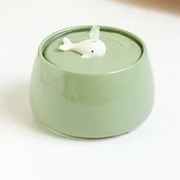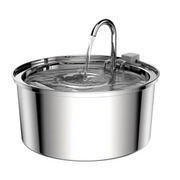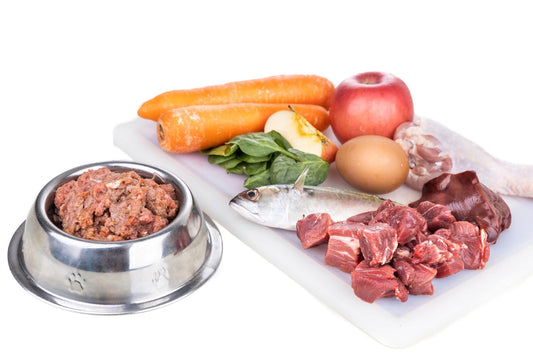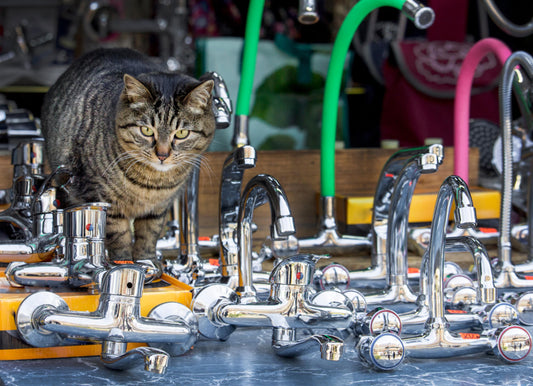Can Cats Eat Raw Chicken? Exploring the Pros and Cons
Cat Water Fountains Australia
Share This Article
Can Cats Eat Raw Chicken?
Cats are obligate carnivores, meaning their bodies are designed to thrive on a meat-based diet. According to reputable sources like WebMD and PetMD, cats can indeed eat raw chicken. The natural composition of raw chicken aligns with their dietary needs, providing essential nutrients like protein, fat, vitamins, and minerals.Pros of Feeding Raw Chicken to Cats:
Numerous benefits have been associated with a raw chicken diet for cats, as highlighted by top-ranking pages:1. Improved Digestion and Nutrient Absorption
Raw chicken is rich in moisture and natural enzymes, which may enhance digestion and nutrient absorption in cats. The live enzymes present in raw meat can assist in breaking down food more efficiently.2. Enhanced Dental Health
Chewing on raw chicken can help keep a cat's teeth clean and strong. The natural action of gnawing meat can help remove plaque and tartar buildup, reducing the risk of dental issues like gum disease.3. Potential Allergy Relief
Some cat owners report that transitioning their cats to a raw chicken diet has helped alleviate certain allergies and sensitivities. However, individual results may vary, and it is advisable to consult a veterinarian if your cat has known allergies.4. Increased Energy Levels and Overall Vitality
Raw diets are often associated with increased energy levels and vitality in cats. This could be attributed to the high-quality protein and nutrient content found in raw chicken, supporting optimal health and well-being.Risks and Concerns:
While there are potential benefits to feeding cats raw chicken, it's crucial to consider the risks involved:1. Bacterial Contamination
Raw chicken carries the risk of bacterial contamination, primarily from pathogens like salmonella and E. coli. According to experts, cats are generally more resistant to these bacteria, but they can still be carriers and potentially transmit them to humans. Proper handling and hygiene practices are essential to minimise the risk.2. Nutritional Imbalances
A raw chicken diet must be properly balanced to meet a cat's nutritional requirements. Without careful formulation, there is a risk of nutrient deficiencies or imbalances. It is advisable to consult with a veterinarian or a feline nutritionist to ensure the diet meets all the necessary nutritional needs.3. Choking Hazards from Bones
Chicken bones can pose a choking hazard or cause injury to a cat's digestive tract. It is crucial to never feed cooked chicken bones, as they can splinter easily. If you choose to feed raw chicken with bones, make sure they are ground or finely minced to reduce the risk.4. Zoonotic Disease Transmission
Raw chicken can carry zoonotic diseases that can be transmitted to cats and humans alike. Thoroughly washing hands and surfaces, and following proper food safety practices, is vital to minimise the risk of disease transmission.Safety Precautions and Best Practices
To mitigate potential risks, follow these safety precautions and best practices when feeding cats raw chicken:- Handle raw chicken with care, using separate cutting boards and utensils.
- Thoroughly wash hands and surfaces after handling raw chicken.
- Source raw chicken from reputable suppliers known for their quality and safety standards.
- Freeze raw chicken for a minimum of 48 hours to help eliminate parasites.
- Consider consulting with a veterinarian or a feline nutritionist to develop a properly balanced raw chicken diet plan.
Alternatives to Raw Chicken:
If you are concerned about the risks associated with raw chicken or prefer an alternative, consider these options:
1. Commercial Raw Cat Food: High-quality commercially prepared raw cat food provides a convenient and balanced alternative to a DIY raw chicken diet. Look for brands that meet industry standards and have undergone rigorous testing.
2. Cooked Chicken: If you prefer to feed cooked chicken, make sure it is thoroughly cooked without seasoning or added ingredients. Remove bones and ensure the meat is cut into small, manageable pieces.
A Balanced Perspective
Cats can safely consume raw chicken, aligning with their natural carnivorous instincts. This diet choice offers potential benefits such as improved digestion, dental health, and increased energy levels. However, it is important to be aware of the risks associated with bacterial contamination, nutritional imbalances, choking hazards, and zoonotic disease transmission. By following proper safety precautions and seeking guidance from professionals, cat owners can make informed decisions about incorporating raw chicken into their feline companion's diet, ensuring their overall well-being.
FAQs
Can cats eat raw chicken bones?
No, it is not safe for cats to consume raw chicken bones. Chicken bones can splinter easily and pose a choking hazard or cause injury to a cat's digestive tract. It is important to remove bones or feed ground/minced raw chicken to mitigate this risk.
How much raw chicken should I feed my cat?
The amount of raw chicken to feed your cat depends on factors such as their age, weight, activity level, and overall health. It is recommended to consult with a veterinarian or feline nutritionist to determine the appropriate portion size and ensure a balanced diet for your cat.
Are there any specific breeds that should not eat raw chicken?
There are no specific cat breeds that should not eat raw chicken. However, individual cats may have unique dietary needs or sensitivities, so it is advisable to consult with a veterinarian before introducing raw chicken or any new food into their diet.
What are the signs of salmonella or bacterial contamination in cats?
Signs of salmonella or bacterial contamination in cats can include vomiting, diarrhea, loss of appetite, lethargy, and fever. If you suspect your cat may be affected, it is important to seek veterinary care promptly.
Is it safe to mix raw chicken with other ingredients in my cat's diet?
Mixing raw chicken with other ingredients in your cat's diet can introduce additional variables and potential risks. It is recommended to consult with a veterinarian or feline nutritionist to ensure that any combination of ingredients maintains a balanced and safe diet for your cat.
Are there any supplements I should consider when feeding raw chicken to my cat?
Supplements may be necessary when feeding raw chicken to ensure a balanced diet. It is advisable to consult with a veterinarian or feline nutritionist who can assess your cat's specific nutritional needs and recommend any necessary supplements, such as taurine or omega-3 fatty acids.
Can kittens eat raw chicken?
Kittens can eat raw chicken, but it is crucial to handle their diet with care. Their immune systems are still developing, and they may be more vulnerable to bacterial contamination. Consult with a veterinarian to ensure proper handling, preparation, and portion sizes when feeding raw chicken to kittens.










